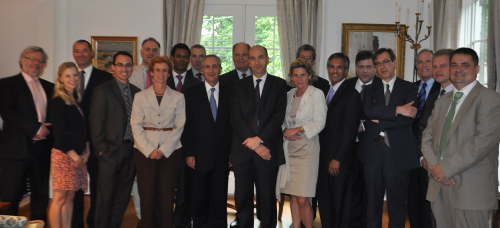From March 8th through the 28th, the United Nations held a conference on the Arms Trade Treaty (ATT)—the last days of a seven-year effort to control the flow of small arms so that they do not end up in the hands of terrorists, organizations aimed at committing human rights abuses, and other malicious entities. The treaty passed a General Assembly vote by the wide margin of 154 to 3, with the three being North Korea, Iran, and Syria. The next step requires fifty countries to ratify the ATT in their local governments for it to be accepted as law worldwide.
Whether or not the ATT is a good idea, and its implications should it become international law, were the subjects of a May 15 event where the Atlantic Council’s Brent Scowcroft Center on International Security hosted Assistant Secretary of State Thomas M. Countryman, American University Professor David Bosco, Oxfam America Senior Policy Adviser Scott Stedjan, and Defense Small Arms Advisory Council Executive Director Major General D. Allen Youngman.
At the event, Secretary Countryman began with a keynote address in which he claimed that the ATT would help “reduce the threat to civilians, soldiers, and others” as conventional weapons—like small arms—are fueling more deaths and conflicts than unconventional weapons. The goal of the ATT is to “raise the standard of states that lack” good control and help “reduce the risk of violence.” He was clear to mention that the ATT, which the United States “will sign,” would not interfere with the second amendment, and therefore not restrict the legitimate trade in arms in the country.
The ATT itself, Secretary Countryman mentioned, is a “good treaty [but] not an ideal treaty,” and will likely not get through the US Senate. This means that while the United States may sign the ATT when the United Nations opens it up for state signature on June 3rd, it may not be ratified in the US government; therefore, the United States would not count as one of the fifty countries required to make the ATT international law.
After his talk, Secretary Countryman sat down and joined the panel. During the discussions, a multitude of opinions were raised. Bosco, for example, lamented that the “treaty won’t do anything on its own” as states are the ones that get to interpret whether the intended recipient of the munitions will use them for human rights abuses or not. If anything, it was yet another instrument in the “moral toolkit” that states get to use on matters like these. Stedjan felt that the “treaty will help” reduce global violence because of the “powerful stigma” the ATT will place on malicious transfers. He felt that the ATT’s passage was an “historic victory,” but that more was needed from states in order to reach the fifty-state threshold. Finally, Youngman was happy to see that the ATT did not infringe upon second amendment rights, but that the ATT might leave it open for some future US leader to interpret as a way to infringe upon them. Further, he thinks the name of the treaty is off; in fact, it should be called the “Small Arms Treaty” since that is the main focus of the document. “There is no black market for submarines” he mentioned. He lastly noted that the world’s major arms exporters – the European Union, China, India, etc. – are not really on board with the treaty, meaning it would be feckless even if ratified.
During the question and answer session, an audience member asked that if the ATT should become international law, how would the world know it was effective ten years afterward? Many answers emanated from the panel. One was whether certain bad transfers did not happen that otherwise would have (although that is near impossible to measure). Another was “transparency,” in other words, making the information as to what dealers are “renegades” public. Third was “lives saved,” which is also hard to measure, but still vitally important. Finally, it’s to force bad companies to stop behaving badly.
While Secretary Countryman readily admitted that the ATT is not perfect, it is still an important step to protect global citizens; in essence, the ATT is a “moral imperative.” The next step for the ATT is the signature period beginning on June 3rd, with both proponents and critics eagerly awaiting the date.
Image: web_3.jpg
